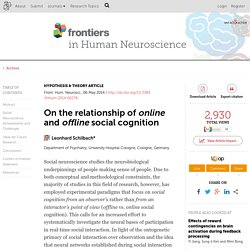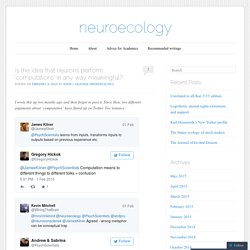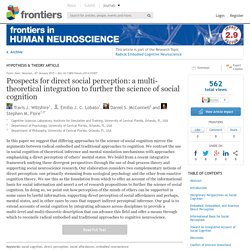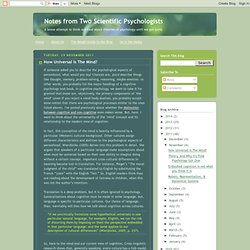

Morphological computation: The hidden superpower of soft-bodied robots. Soft robots are versatile, often much safer, more energy-efficient, robust and resilient than their more rigid counterparts.

But one of the biggest challenges facing soft robotics is control – often, classical approaches don’t apply. The answer may lie in morphological computation, an idea that stems from biological systems using their bodies to control basic actions. Novel designs in soft robotics reference simplicity as well as versatility. The Jaeger-Lipson coffee-balloon gripper is one example. Essentially a balloon, it’s filled with ground coffee and can be either soft or hard depending on the air pressure within it. Morphological computation proposes that at least some aspects of control (such as walking or grasping) can be outsourced to the body as these functions are already “encoded” within it. Notes from Two Scientific Psychologists: Replication will not save psychology. 10407413.2015.1068655?journalCode=heco20# On the relationship of online and offline social cognition. Social Neuroscience: Achievements and Challenges Social neuroscience has come a long way since its inception (Frith and Frith, 1999; Ochsner and Lieberman, 2001) and has helped to characterize the neurobiological bases of various aspects of social cognition.

In particular the advent, refinement and more wide-spread use of functional magnetic resonance imaging (fMRI) has furthered insight into mapping social cognitive capacities onto brain areas and neural networks. In the process, two large-scale neural networks have taken center stage as the neurobiological substrate of social cognition: the so-called “mirror neuron system” (MNS) and the so-called “mentalizing network” (MENT). The MNS has been taken as evidence for a first-person or simulationist account of social cognition. Is the idea that neurons perform ‘computations’ in any way meaningful? I wrote this up two months ago and then forgot to post it.

Since then, two different arguments about ‘computation’ have flared up on Twitter. For instance: I figured that meant I should finally post it to help clarify some things. I will have more comments on the general question tomorrow. Note that I am pasting twitter conversations into wordpress and hoping that it will convert it appropriately. The word ‘computation’, when used to refer to neurons, has started to bother me. In The Future of the Brain (review here), Gary Marcus gives a nice encapsulation of what I am talking about: Biologicalpsychiatryjournal. It’s Not a ‘Stream’ of Consciousness. IN 1890, the American psychologist William James famously likened our conscious experience to the flow of a stream.

“A ‘river’ or a ‘stream’ are the metaphors by which it is most naturally described,” he wrote. Grounding Cognitive-Level Processes in Behavior: The View From Dyna... Notes from Two Scientific Psychologists: Are we Infomation Processers? (A brief note) Prospects for direct social perception: a multi-theoretical integration to further the science of social cognition. 1Cognitive Sciences Laboratory, Institute for Simulation and Training, University of Central Florida, Orlando, FL, USA2Department of Psychology, University of Central Florida, Orlando, FL, USA3Department of Philosophy, University of Central Florida, Orlando, FL, USA In this paper we suggest that differing approaches to the science of social cognition mirror the arguments between radical embodied and traditional approaches to cognition.

We contrast the use in social cognition of theoretical inference and mental simulation mechanisms with approaches emphasizing a direct perception of others’ mental states. We build from a recent integrative framework unifying these divergent perspectives through the use of dual-process theory and supporting social neuroscience research. Our elaboration considers two complementary notions of direct perception: one primarily stemming from ecological psychology and the other from enactive cognition theory. Enacting a social ecology: radically embodied intersubjectivity. Reasons to abandon mental representations (with tweets) · PsychScientists. Notes from Two Scientific Psychologists: What are the units that perception measures the world in? Firestone vs Proffitt. Notes from Two Scientific Psychologists: Embodied cognition in practice - some thoughts and an open invitation.
Notes from Two Scientific Psychologists: F*cking affordances - how do they work? Over on Bounds of Cognition, Ken has been doggedly pursuing what he thinks is a critical problem with the concept of affordances as described by Gibson (1979) and expanded on by Turvey, Shaw, Reed & Mace (1981; hence TSRM).

I feel the need to spend some time consolidating my responses and some ideas in one place; every time I try to lay out why the problem is ill-posed or a potential route out, Ken just says I'm clouding or avoiding the issue or throwing out red herrings. I actually think Ken has identified one very useful critique of the affordance concept: the lack of care with which we attach '-able' to words. But Ken isn't just making a methodological point; he thinks he's shown that affordances cannot structure light in a way that can specify the affordance, and that's the argument that needs to be tackled. Saddle up: this is going to take some time, and I'm not going to solve everything.
But to get a little ahead of myself, the answer to the problem is that it's complicated. 1. Notes from Two Scientific Psychologists: Introduce yourselves, dear readers. Dear readers: We keep finding out that all kinds of people are reading our blog, when you email us, or when we say 'hey, you should totally read our blog' and you say 'I already do!

'. Lots of you don't comment much, though, so we never find out who you are and we're actually quite interested. So if you read us, take a moment to leave us a comment below. Introduce yourselves, tell us a little bit about what you do and why you're reading us, and, if you blog and whatnot yourself, feel free to leave links for people to find your stuff too.
Also, please feel free to comment on things if you want to; we both see comments on any posts, even the old ones, and we like the attention! The Rough Guide to the Blog. Notes from Two Scientific Psychologists: How Universal Is The Mind? If someone asked you to describe the psychological aspects of personhood, what would you say?

Chances are, you'd describe things like thought, memory, problem-solving, reasoning, maybe emotion. In other words, you probably list the major headings of a cognitive psychology text-book. In cognitive psychology, we seem to take it for granted that these are, objectively, the primary components of "the mind" (even if you reject a mind/body dualism, you probably accept some notion that there are psychological processes similar to the ones listed above). I've posted previously about whether the distinction between cognitive and non-cognitive even makes sense. But, here, I want to think about the universality of the "mind" concept and its relationship to the modern view of cognition. In fact, this conception of the mind is heavily influenced by a particular (Western) cultural background. Translation is a deep problem, but it is often ignored in psychology.